Have you ever wondered, can you live in an RV? Is it legal? And more importantly, is full-time RV living right for you? We have the answers!
Our family had similar questions before we launched into the RV lifestyle back in 2015. It’s been over 8 years now and we still live in an RV.
In this complete guide, we will share everything you need to know about RV living so you can make a confident decision.
(This article contains affiliate links. When you purchase using these links, I earn a small commission at no additional cost to you. This helps to keep the content on this site free which is a win win for both of us! See the Disclaimer.)
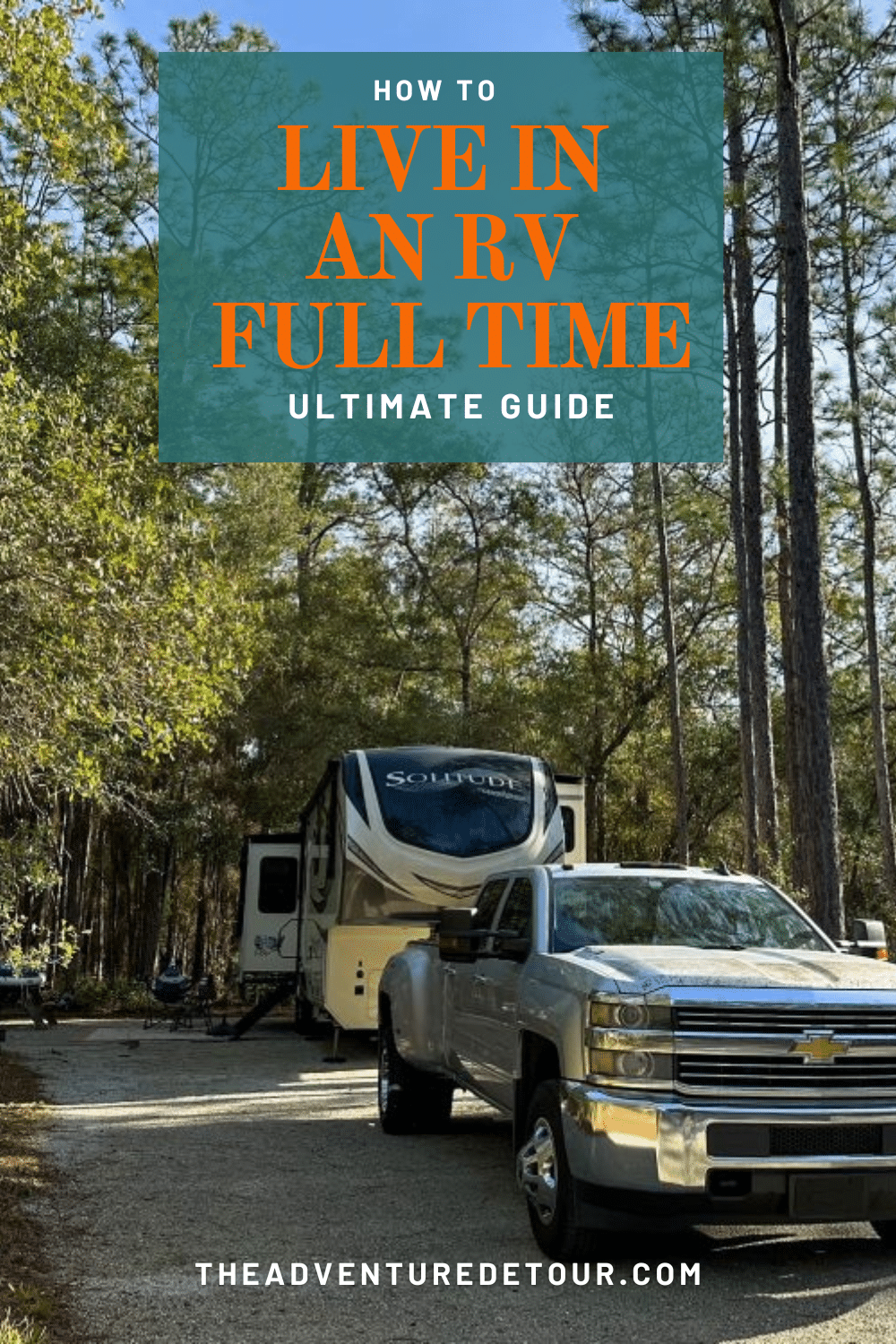
Are You Considering Full-Time RV Living?
Embarking on a full-time RV lifestyle is an exciting and adventurous decision, but it’s essential to carefully consider whether it’s the right choice for you.
Living in an RV comes with unique challenges and adjustments, so understanding the pros and cons of this unique lifestyle will help you determine if it fits your personality and preferences well.
When considering the full-time RV life, one must think about factors such as finances, where it’s legal to stay, travel pace, and RV living space.
Budgeting for full-time RVing expenses like gas, food, and activities is a large part of a budget on the road, as full-time RV living may not be as cheap as you think.
We quickly realized that what we budgeted on paper for RV living wasn’t true to the actual expenses on the road.
There are many unplanned expenses that pop up monthly as you travel.
Additionally, embracing a slower-paced lifestyle with time for daily living is key to enjoying the journey and not just the destinations.
Keep in mind that your living quarters will be significantly smaller, requiring adaptability and a minimalistic mindset.
Understanding The RV Lifestyle – What Is Full Time RVing All About?
Full-time RV living is a lifestyle where you live in a recreational vehicle, either constantly traveling or staying stationary at an RV park or on privately owned land.
Choosing this lifestyle is a huge life decision. RV living really takes you out of your comfort zone.
It’s not just one long vacation or a series of long trips. There are many aspects to consider before diving in.
For example, you may need to consider your financial situation, career or work, and how far you will be from friends or family.
Many RVers choose this way of life for the freedom, flexibility, and opportunity to explore new places, while others appreciate the simplicity of living small.
Regardless of why you are considering this new life adventure, understanding the pros and cons of RV living can help you decide whether it’s the right choice for you.
Keep reading to learn the benefits and drawbacks of the RV lifestyle!
Traveling Full Time Versus Stationary RV Living
There are two main ways that people jump into a full-time RV adventure, traveling full time in an RV or stationary RV living.
Adventurers that RV travel full time move around in one general area or across the country. This is a great way to explore new places and check out new campgrounds.
While this is the most exciting option for those that love traveling and new experiences, it can also be a lot of work to plan the next trip destination and where to stay constantly.
The more time RVers spend on the road, the more RV living costs and the more repairs and maintenance are required on the RV and vehicle.
Those RVers that are stationary in one location embrace living simply. Stationary RV living can be staying long-term in a privately owned campground or living in an RV on private land.
Stationary RV living can be the most affordable option for those that are looking to save money versus living in a house or an apartment.
Stationary RVers have more predictable monthly expenses and overall fewer repairs due to less wear and tear going down the road.
RV insurance and utility fees are also very different for those who are RV living stationary versus those that travel full-time.
Being stationary doesn’t have the excitement of exploring new places, but it can be a rewarding challenge for those willing to embrace tiny living.
We have never stayed in one location long in our RV, and honestly, we get a little stir-crazy when we are in one spot too long.
Our longest stay was 3 months in a campground when things were a bit uncertain during the pandemic.
Even for those who love traveling, sometimes it helps to take a break for a season to catch up on life or rest.
Can You Legally Live In An RV?
Many people wonder, is it legal to live in an RV full-time?
Let’s dive into some different RV lifestyle scenarios so you can get a better idea if RV living meets your needs.
Can You Live On Your Own Land? Or Someone Else’s Land?
Living in an RV on private land depends on local zoning laws and ordinances. The answer to, can you live in an RV on your own land all boils down to location.
Every city or county has different rules and regulations regarding living in an RV.
Keep in mind that these laws vary from one location to another, so always check with your local authorities to ensure compliance.
Some areas may have specific rules about where you can park your RV, particularly in residential neighborhoods.
Zoning rules apply to parking your RV on your own property or someone else’s.
If it is your desire to purchase land to park your RV, do extensive research to see if it is allowed in that particular county or city.
Can You Live In An RV At A Campground?
Usually, the answer is yes! Many campgrounds offer long-term stays for RVers, and some even provide amenities specifically designed for full-time RV living.
However, each campground may have its own policies regarding stay length, so be sure to research and inquire about any restrictions prior to your arrival.
Some campgrounds don’t allow long-term stays.
Some places allow an RV to be parked long-term at a campground but limit the number of nights per year you can stay in the RV.
It helps to find out all the details before you pick a place to stay long-term or live stationary in an RV.
Can An RV Be A Permanent Residence?
Stationary RV Living
In zoning areas that allow an RV to be parked on private land, an RV can usually be considered a permanent residence.
The land address where the RV is parked can be the permanent address.
Check the regulations of the area you are considering to see where long-term parking is allowed and to make sure your RV satisfies the requirements for a legal domicile.
Full Time RV Living While Traveling
RVers that travel full time select a domicile state in which they either spend a lot of time or have business ties.
To have a permanent home address when traveling full-time, the requirements typically include having a physical mailing address, tax registration, and voter registration at your chosen domicile location.
We will discuss establishing a domicile for RVers that travel full-time later in this article.
Are You Homeless If You Live In An RV?
Generally, no, living in an RV does not categorize you as homeless.
You have a permanent address as long as you maintain a legal residence or domicile while living in your RV.
There are a few possible gray areas where RVers may be considered homeless by local authorities:
- Not having proper plumbing facilities/bathroom
- Staying on the street or in illegal public areas without a permanent address
- In rare instances, some families reporting living in an RV to the school district of an enrolled child have been labeled as homeless
Full-time RV living is a lifestyle choice that offers freedom and flexibility, allowing you to travel and explore without being constrained by conventional housing.
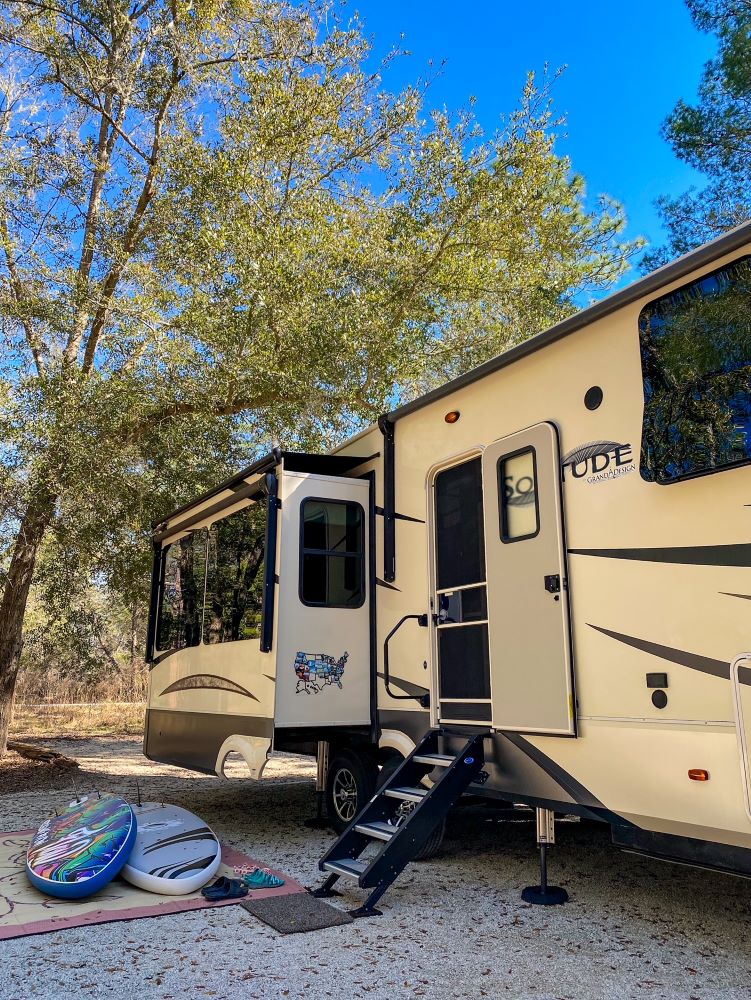
How To Know If You Would Enjoy The Full Time RV Lifestyle
Now that we have talked a little bit about what RV living is and where it is legal let’s dive into figuring out if the RV lifestyle is right for you.
You can live in an RV, but should you? Here are some things to consider.
RV Living Isn’t Like Living On Vacation!
This fact slammed us in the face very quickly during our first 6 months of full time RV living.
Our visions of adventures by day and campfires each night didn’t exactly match up with reality, and I will explain why.
RV living isn’t the same as a vacation because daily living still gets in the way. Full time RV travel is a lot of work.
From packing up, driving, setting up, performing RV maintenance, fixing the things that constantly break on an RV, and non-stop trip planning/reservations, it’s more work than most people anticipate.
There are also still daily living tasks like paying bills, cleaning, laundry, grocery shopping, work/school, and the need to just rest sometimes.
RV living is a mix of exciting travel adventures and plain old boring daily tasks.
It helps to understand the difference between a vacation and a lifestyle so you have the right expectations.
To know if you would like RV living, it’s a good idea to ask yourself the following questions.
Do You Do Well With Change?
Embracing the full-time RV lifestyle means adapting to constant change.
As you travel, you will encounter different weather, terrains, and cultures.
Even simple daily tasks like going to new grocery stores at each stop and not knowing where anything is located is a good example of the constant changes you will face when traveling.
Think about how you handle change in your daily life and consider if you can thrive in a continually changing environment.
If you find excitement in exploring new places, meeting diverse people, and adjusting to the unknown, you may enjoy living in an RV.
Do You Have A Flexible Personality?
Flexibility is a key trait for successful full-time RV living.
Plans can change due to weather, wildfires, RV mechanical issues, medical needs/injuries, or unforeseen circumstances.
You need to be able to adapt and find creative solutions. Assess your ability to stay calm under pressure, think on your feet, and accept varying conditions.
If you’re open-minded, curious, and able to go with the flow, the RV lifestyle may suit you.
The best thing is to see both the tough times and the exciting times as all part of your adventure!
Are You Handy? Or Do You Have A Budget And Savings For RV Repairs?
The raw and very real truth about RV living is that RVs need frequent maintenance and constant repairs.
We were shocked at how often things break after going down the road, even just a short distance.
It’s an unfortunate reality of the RV lifestyle that can strap you for cash and ruin the experience if you aren’t prepared.
The best solution is to either have some basic mechanical skills or be prepared to invest in professional maintenance.
If you’re willing to learn, online resources and fellow RVers can be great sources of knowledge.
Consider your willingness to tackle these tasks yourself or ensure you have a sizable budget for maintaining your RV.
Being prepared for the unexpected will help you enjoy a full-time RV life more comfortably.
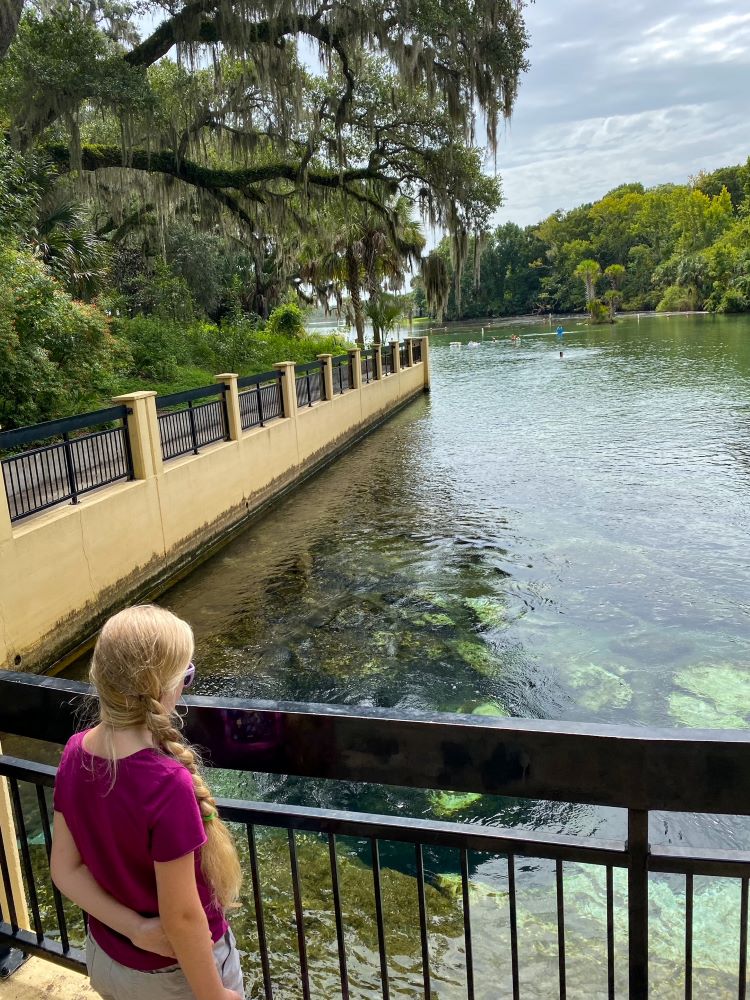
Pros and Cons of Full-Time RV Living
I am sure you are considering RV living for the freedom and adventures the RV lifestyle offers.
Our family has traveled full-time in an RV for 8 years now and knows the pros and cons well.
Let’s look at some of the benefits and the drawbacks so you know what to expect!
RV Lifestyle Pros
Freedom To Go Wherever You Like
One of the biggest advantages of living in an RV is the freedom to go wherever you like.
You can follow the good weather or visit all those places on your bucket list. The world is truly your oyster when living the full-time RV lifestyle.
Quality Time Together
Whether you’re traveling solo, with a partner, or with a family, the full-time RV lifestyle offers the opportunity to spend quality time together.
The shared experiences create stronger bonds, and living this unique lifestyle allows moments and time for deeper connections.
Making Incredible Travel Memories
As you explore new places and revisit old favorites, you’ll create incredible travel memories that will last a lifetime.
New destinations bring unique experiences, scenery, and opportunities to learn about different cultures.
Our family has the craziest stories from our travels through 42 states.
Everything from natural disasters, wild weather, crazy animal encounters, surprising discoveries, tons of learning opportunities, and unexpected friendships have become part of our adventure.
Meeting New People And Trying New Things
Living in an RV allows you to meet new people from different walks of life and try new things.
From organized events to spontaneous meetups, you’ll encounter a wonderfully diverse community of travelers that share a love for exploration and adventure.
Embrace Travel Experiences And Time Together Over Owning More Physical Possessions
A full-time RV lifestyle encourages you to prioritize experiences and time together over collecting material possessions.
With less room for belongings, you’ll focus on what truly matters in life and create a more minimalist approach to living.
Some are drawn to the RV lifestyle because they want to embrace tiny living and they don’t need much space.
Others like us get into RV living because we want to travel but still have way too much stuff and struggle with the tiny living part.
Regardless of how you feel about downsizing, your travel experiences will quickly become more valuable than the physical possessions you own!
Can Sometimes Save Money Compared To Living In A House
While this is not always the case, some people find that living in an RV can save them money compared to living in a house.
Living on the road can reduce housing expenses like rent or mortgage payments, property taxes, and utilities.
Your savings will depend on how expensive your housing was before beginning the RV lifestyle, if you have RV payments, the kind of RV you get, boondocking versus paid campgrounds, how far/fast you travel, and if you enjoy paid activities in each location.
For our family, we spend about the same RV living as we did owning our Midwest home.
Gas, campgrounds, activities, and RV repairs are about the same as our house costs. For us it’s not about saving money but about the travel adventures and time together that make it all worth it!
Can Stay Longer And Really Get To Know An Area Versus Traveling On Short Vacations
With a full-time RV lifestyle, you have the flexibility to stay in each destination as long as you like.
This allows you to get a true feel for the local culture, experience local events, and explore lesser-known attractions that you might have missed on a short visit.
That old dreaded feeling of having to return home after a vacation is over is no more.
Now you can go where you like and stay as long as you want which is perfect for those with a sense of adventure.
This is, of course, assuming you can get the campground reservations you need. Campground availability is a huge con right now in the RV lifestyle!
Grab our FREE GUIDE with tips for how we score tough-to-get RV campsites.
Get your Reservations Tips FREE GUIDE HERE!
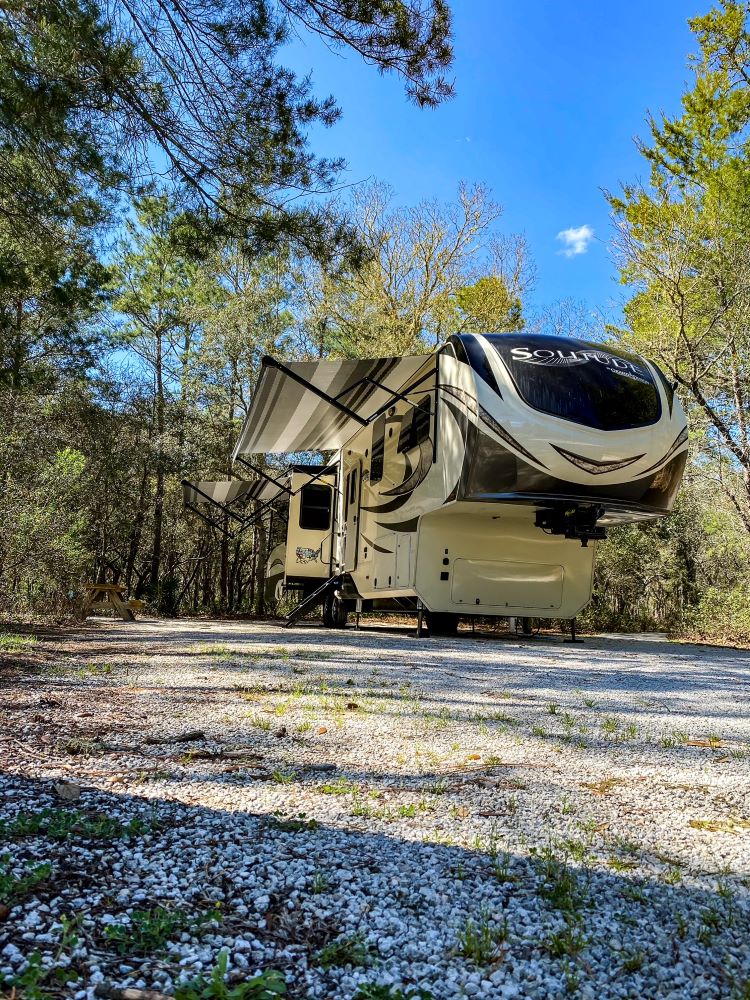
RV Lifestyle Cons
RVs Break All The Time
On the flip side, one of the largest drawbacks of living in an RV is that it can require frequent repairs and maintenance.
This can be both time-consuming and costly and may diminish some of the joy of traveling.
We recommend maintaining a sizeable emergency savings account and budgeting monthly costs for RV repairs.
One trick we have for keeping RV repairs from ruining our travel plans is to use mobile repair services.
These technicians are located all over the country and come to you at your campsite to work on your RV so that you can still stay in your home on wheels versus dropping it off at a repair shop.
We have used RV mobile repair services all over the country and have found that they usually do an excellent job and quickly get it done so that our travel plans are minimally interrupted.
Severe Weather, Flooding, And Fires Can Be Stressful On The Road
Living in an RV exposes you to the elements, including severe weather, flooding, and wildfires, which can be stressful when you are on the road.
It’s essential to stay informed about the weather conditions and plan accordingly to keep yourself and your home on wheels safe.
The best advice we can give you here is that when in doubt, pack up and go while you still can.
During our years on the road, we have been stranded in floods, evacuated from floods, rode out hurricanes, left the RV and stayed in hotels for hurricanes, had tornado RV roof damage, and evacuated from wildfires.
The truth is that being in an unfamiliar area when extreme weather happens can make you feel very vulnerable.
Sometimes if you wait too long, the situation can escalate quickly, and you can’t always leave.
We have learned that SHTF very fast when you are RV traveling, and if you are unsure about a situation, take your home on wheels and get out of there.
Downsizing Can Be Hard
The transition from a traditional home to a full-time RV lifestyle often involves downsizing possessions, which can be difficult.
It’s not easy to part with sentimental items or determine what belongings are necessary for life on the road.
Consider putting keepsakes in storage units or asking a trusted family member or friends to keep some items for you.
We sold our house and about 80% of our belongings when we dove into RV living. However, I didn’t get rid of our keepsakes.
Luckily my parents were nice enough to store some things that our daughter didn’t want to part with.
It’s sometimes harder for kids often to let go of things.
They also have all of our keepsakes for us. As an avid scrapbooker, I have photo albums for the first 6 years of our daughter’s life that I was never going to part with.
Of course, depending on the size of the RV you choose to live in, you will have room to bring the necessities and other must-have items with you in the RV.
Often Unexpected Expenses As You Travel
While you may save money on some aspects of living in an RV, there can often be unexpected expenses as you travel.
Gas, campground fees, maintenance, and repairs can quickly add up, making it important to budget carefully.
Always have a part of your monthly budget for unexpected expenses and RV repairs because things tend to pop up often when traveling.
Full-Time RV Travel Can Be A Lot Of Work
Contrary to popular belief, living in an RV full-time requires a lot of work.
From planning routes and making reservations to maintaining the RV itself, the lifestyle demands a substantial amount of organization, flexibility, and effort.
Just packing, unpacking, setting up, and constantly driving your new home on wheels can be tiring.
The neverending trip planning, RV route planning, and making campground reservations can leave you feeling like a travel agent.
It’s honestly a lot more work than we anticipated, but we find it so rewarding that it is worth it for our family!
Easy To Get Burnt Out If You Don’t Allow Time For Daily Living
The constant travel days and planning can lead to burnout if you don’t allow time for daily living, relaxation, and self-care.
It’s essential to find balance amidst the adventure and excitement of the full-time RV lifestyle.
Almost every full time RVer travels too far too fast in the first year and can begin to feel tired or a little burnt out.
It’s very hard to find the balance of daily living with RV travel. It helps to travel slower and spend more time resting at each stop.
You can’t just go go go all day every day or this becomes an easy way to get burnt out.
If you don’t have time to catch up on life, the adventure can quickly end up feeling like you are going through the motions.
We find that 2-week stays are the sweet spot for our family.
That gives us time to explore while also getting work done, roadschool completed, and time to rest.
Give yourself a little time, and you will find the pace that works best for your traveling crew.
Don’t be afraid to make adjustments to your schedule.
You will enjoy your adventures more if you aren’t dragging around worn-out travelers!
An RV Is Not A Good Financial Investment Like A House
Unlike a house, an RV is not a good financial investment.
RVs depreciate in value very quickly, so you’ll likely not see a return on your investment as you would with a traditional home purchase.
That being said, I don’t know anyone that purchases an RV as a financial investment.
RVs are an investment in living, in time together, and in experiences. Not all investments are financial!
When Plans Need To Change, Reservations All Fall Like Dominoes
When you are full-time RV traveling, you always have to have a reservation or place planned to stay.
The issue with a whole line of back-to-back reservations is that if your trip gets delayed due to weather, health, RV repair, or other unplanned event, all of your reservations fall like dominoes.
This can leave you scrambling to find a place to stay when campgrounds are full, and you are trying to book on short notice.
This can be very stressful, but it’s part of the RV lifestyle. This leads to the next related drawback regarding campground reservations.
Getting Campground Reservations Is A Challenge
One of the biggest benefits of the full time RV lifestyle is the freedom to go where you like, when you like, and for as long as you like. So what’s the problem?
Camping popularity has exploded in recent years, and it can be a real challenge to get campground reservations.
The lack of campground availability has really challenged the freedom of this lifestyle.
You can get past this issue if you enjoy boondocking which is also the cheapest way to stay.
A hack we have found to get around the lack of campsite availability is to use Arvie.
Arvie is a service that searches for campsite cancellations and books them for you.
This way, you don’t need to make travel plans and reservations so far in advance, but you can still snag a campsite.
It’s been a game-changer for us. We have even used Arvie twice now to score oceanfront state park camping in Florida.
That reservation would have been about impossible without using this service.
Get your Arvie FREE TRIAL HERE + 10% off to check it out for yourself!
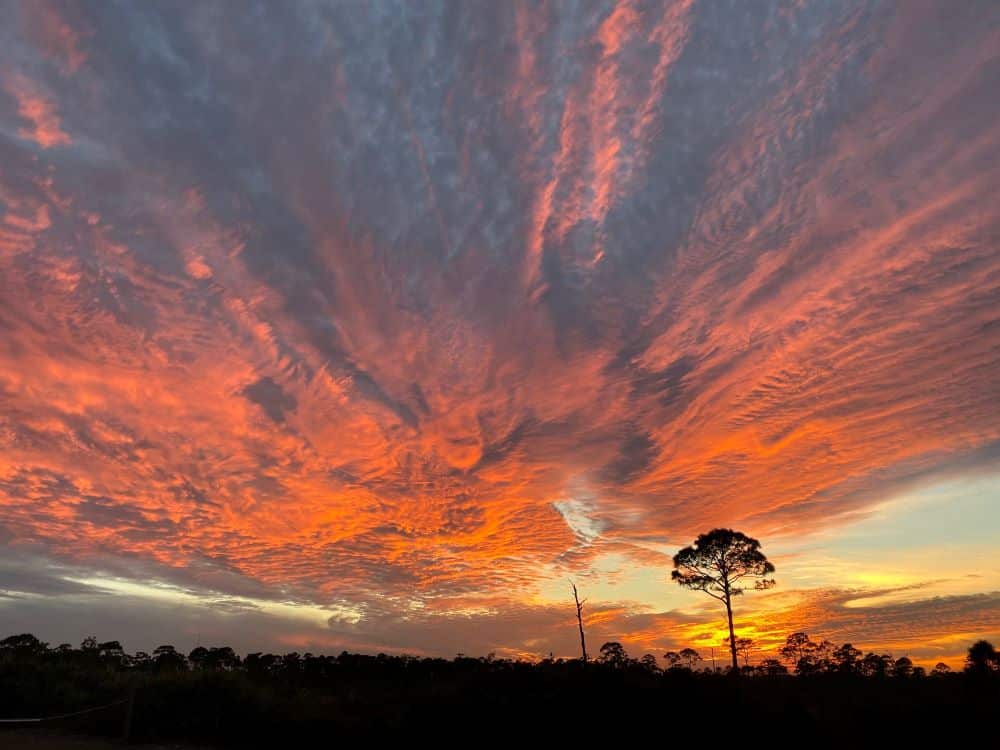
Important RV Living Considerations
Before deciding to jump into the full-time RV lifestyle, there are a few important things to consider.
Understanding these aspects will help you make an informed decision about whether this way of life is right for you.
Cost
First, consider the costs associated with full-time RV living.
Expenses include campsite fees, fuel, RV and vehicle payments, and activities as you travel.
The ability to minimize your cost of living on the road is a significant benefit of this lifestyle, as you can live luxuriously or on a budget while traveling.
Everyone’s full time RV living budget is very different.
Maintenance
Maintenance of your RV is crucial. Regular inspection, repair, and upkeep will make a significant impact to ensure a safe and enjoyable journey.
Maintaining an RV is different from maintaining a house, and it’s important to learn how to keep your home on wheels in tip-top shape to prevent more costly repairs.
Weather
Another essential factor is being prepared for the various types of weather you may encounter on the road.
Plan your travels with the climate in mind, invest in proper gear, and be prepared to stay safe in extreme conditions.
RV Living Routine/Organization
Establishing a routine early on will improve your overall experience of living in an RV.
Keep important items like your keys and wallet in a designated place so you always know where they are.
Creating a sense of order within your home base on wheels will help you adapt to the lifestyle more quickly.
Income
Lastly, consider your ability to work remotely or find employment opportunities in the areas you visit.
Those who can work remotely will find transitioning to the full-time RV lifestyle more manageable.
If you rely on location-based employment, research your options in advance.
We work remotely as freelance writers and content creators.
It’s easier right now than ever to find remote income opportunities that work well with full time RV travel.
By considering these factors and understanding the benefits, you will be better equipped to determine if the full-time RV lifestyle suits you.
Keep reading for more details on these considerations!
How To Downsize To Move Into An RV
Before you can embrace the full-time RV lifestyle, it’s crucial to downsize your belongings and adapt to living in a smaller space.
Here are some tips to help you transition smoothly into RV living.
Organize Possessions
First, begin by organizing and sorting your possessions.
This process will make it easier for you to decide which items to keep/store, sell, donate, or bring in the RV.
One Room At A Time
Break down the process into manageable chunks, such as tackling one room at a time, to avoid feeling overwhelmed.
As you review your belongings, be ruthless in your decision-making. Ask yourself if each item is truly essential for your new lifestyle.
Something funny we did when going through our possessions was to ask ourselves, do we want to own this stand mixer, or do we want to go to the Grand Canyon.
I know this sounds a bit funny, but it really helped us to part with things!
It’s all just stuff in the end, and it can all be bought again.
Limited RV Storage And Weight
Keep in mind that storage space and, more importantly, available cargo carrying capacity in an RV is limited even in a large RV, so only the most useful and meaningful items should make the cut.
Sentimental Items
Remember, you can always take photographs of sentimental items to preserve their memory without taking up physical space.
Or ask a loved one to store some of your keepsakes.
Sell Versus Donate
Selling items through Craig’s List or in garage sales is time-consuming.
Consider selling the larger, more expensive items like furniture and donating smaller items if you are overwhelmed or short on time.
That is what we did since we only had about a month to downsize our 3,000-square-foot house into 300 square feet in the RV.
It sold faster than we thought, and it was a bit overwhelming.
We sold our furniture and large items to help fund our RV travels, but we didn’t have the time to deal with the small stuff.
We had a donation truck come on multiple days to take the less valuable items.
How It REALLY Feels To Drive Away!
The feeling we had the day we drove away from our house in the suburbs back in 2015 was indescribable.
It was as if the weight of the world was off of our shoulders. No more mortgage and less stuff felt like a whole new start in life.
Downsizing into the small space is the most stressful part of beginning the full time RV lifestyle, but once you are on the other side of it, chances are good that you will feel the same relief and excitement that we did.
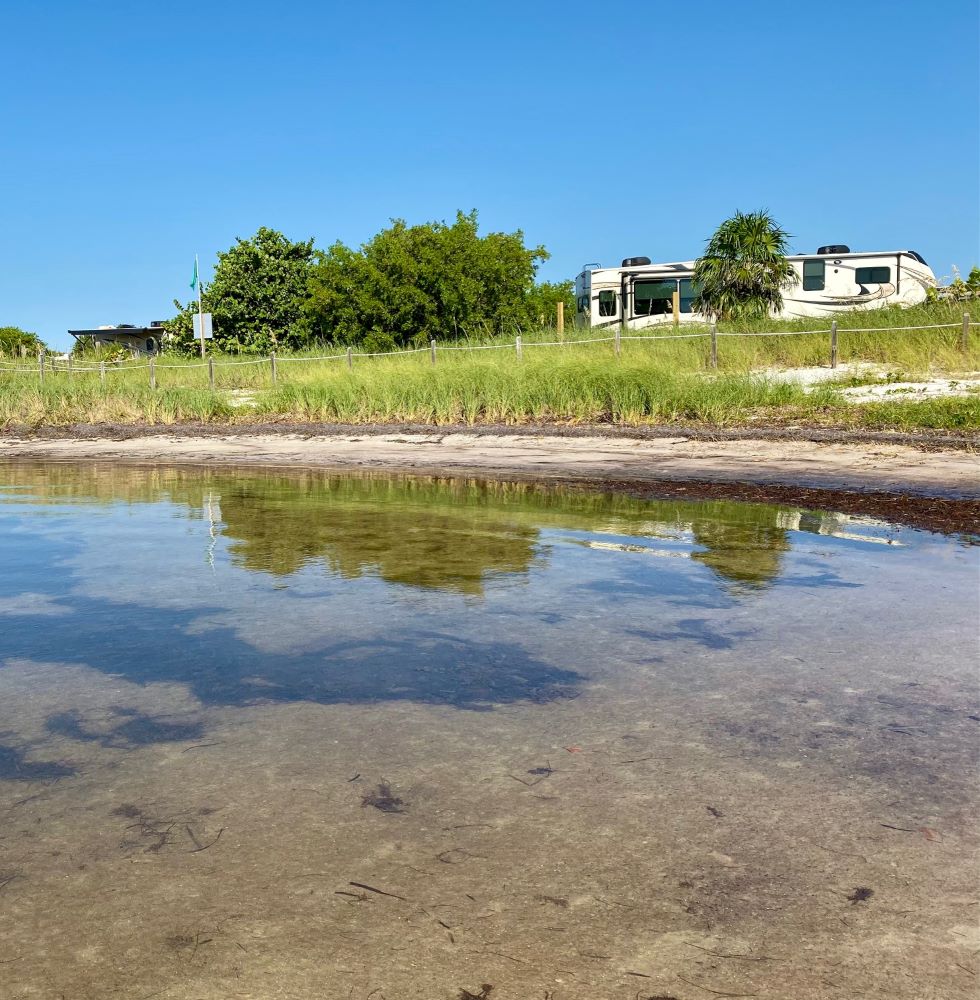
Choosing the Right RV For Full-Time RV Living
There are a mind-numbing amount of RV options that you could choose for beginning your RV lifestyle.
How do you find what is best for you? Here are some things to consider to help you make the best choice.
Pick The Right RV Size For The Places You Would Like To Stay
When starting your full-time RV journey, it’s important to choose an RV that will fit in the places you want to visit.
If you plan to frequent national parks, for example, a smaller RV may be more suitable as certain parks have size restrictions, often less than 35-37 feet.
On the other hand, if you want to stay primarily in private campgrounds or RV parks, a larger RV could provide you with more amenities and space.
Picking the best RV to live in is a balance between having enough living space while also being able to fit in the campgrounds you wish to stay in.
Pick An RV Size You Are Comfortable Driving And Parking
Driving and parking an RV can be a challenge, especially for beginners.
If this is your first RV, it’s a good thing to pick an RV that you feel comfortable driving and maneuvering.
Keep in mind that larger RVs may require more skill and experience.
We recommend that you test drive or even rent an RV before purchasing, allowing you to gain some experience and better understand your preferences and limitations.
Consider Tank Size And Power Sources If You Would Like To Boondock
If you plan on boondocking or camping without hookups, consider the size of your tanks and the availability of power sources.
Larger freshwater and black water tanks are essential when staying off-grid, as are efficient power sources like solar panels and generators.
Be sure to research and select an RV with the right features for your boondocking adventures.
Picking The Best Layout: Do You Need An Office Space? Or Extra Sleeping Spaces?
When shopping for RVs, consider the best layout for your specific needs.
If you work remotely, you may need a dedicated office space.
For those who plan to host guests or have a larger family, extra sleeping spaces might be necessary.
For those with large families, food storage can be a priority. Check out RV models that have a pantry and a larger RV refrigerator.
We love to look at RV floor plans and tours on the website RV Trader.
That can be a great way to find models that you want to view in person.
What Tow Vehicle Will You Need?
If you decide on a towable RV, such as a travel trailer or fifth wheel, consider the tow vehicle requirements.
Ensure your current vehicle or the vehicle you are looking at can handle the towing capacity of your desired RV.
Large trucks with enough towing capacity for hauling large fifth wheels can be very expensive.
Never skimp on the towing capacity of a truck. You always want more towing capacity available than needed.
Trust us on this one! You will thank us later when you are trying to tow your home on wheels through the mountains.
Also, keep in mind how much storage you will need and how much cargo-carrying capacity the trailer you are considering has available.
You never want to overload a trailer for safety reasons.
What Can You Afford?
Will an RV payment limit your travels? What is the cost of the towing vehicle or toad you will be towing?
It’s possible to become RV poor in the same way that people make the mistake of being house poor.
While I am sure you are looking for a comfortable home on wheels, don’t forget about why you want to embark on this journey in the first place.
If you want to enjoy traveling and new experiences over possessions, then you may want to focus your financial resources on activities versus the best RV you can afford.
New Versus Used RV
Should you but a new RV or a used RV for your RV living adventure? That is often the big question!
Used RVs can save you a lot of money with a lower purchase price, cheaper insurance, and lower depreciation.
However, a new RV comes with the manufacturer warranty and has a lesser chance of having water damage, mold, or delamination.
Just something to consider!
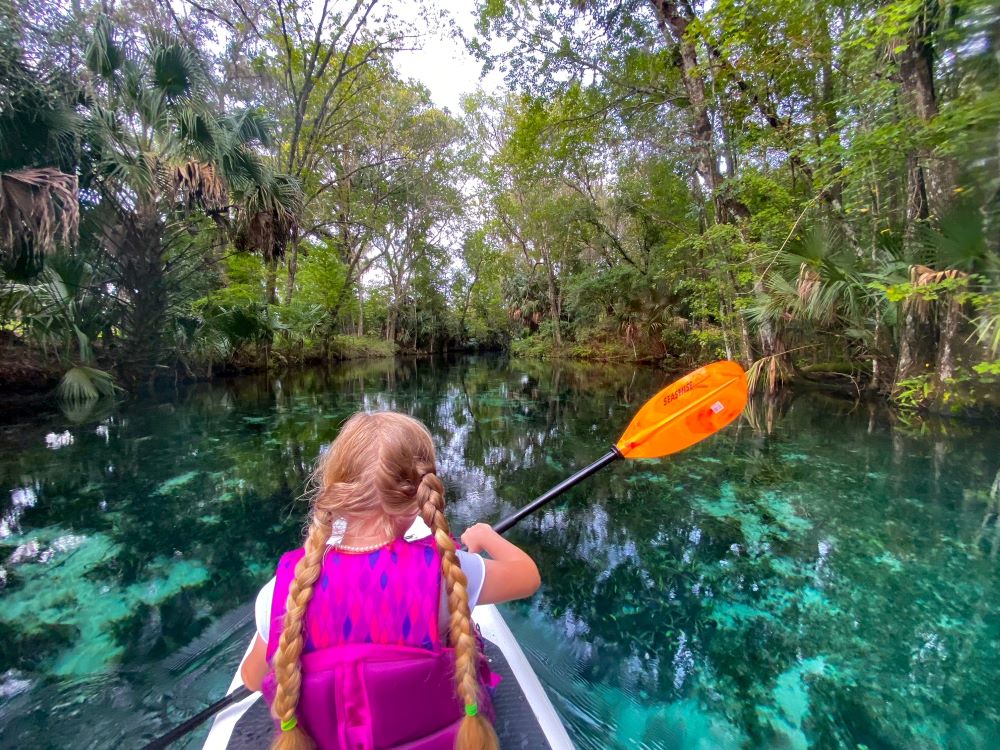
Finding A Full Time RV Insurance Policy
As you consider embracing the full-time RV lifestyle, it’s important to think about getting the right insurance policy.
Full Time RV Insurance is specially designed for individuals who spend a significant amount of time living in their RV.
When Do You Need A Full Time RV Policy?
Generally, if you spend more than 150 nights per year in your RV, you should consider purchasing full-time RV insurance.
Companies That Insure Full Time RVers
To find the best full-time RV insurance policy, start by looking into companies that offer comprehensive coverage.
Large insurance companies that cover full time RV living include Progressive and Geico.
Adequate RV Contents Coverage
Make sure the policy covers both your RV and personal property inside the RV.
We upgraded the contents coverage on our full time RV insurance policy through Progressive since we have so many of our belongings with us in the RV.
Searching for full-time RV insurance isn’t much fun but it’s important to explore the available discounts and deductible options.
Though the price is a factor, prioritize a policy that offers comprehensive coverage and excellent customer service to ensure your needs are fully met.
Add On Items
Don’t forget to customize your coverage to fit both your RV and unique lifestyle. You may need to add items to your coverage, such as a fifth wheel hitch, tow dolly, or electric bikes.
Take the time to explore different coverage levels and add-ons that cater to your specific living situation.
Emergency Hotel Coverage
Something else we chose to upgrade was the emergency hotel coverage in case we were without our RV for an extended amount of time due to an accident.
RV Replacement Coverage
Many full time RVers with newer RVs also choose to get RV replacement coverage, so if their RV is totaled in an accident, they will get a new RV instead of losing out due to depreciation.
Roadside Assistance
Also, decide if you want to add RV roadside assistance with your coverage or if you want to go with a dedicated RV roadside assistance company such as Good Sam’s Roadside Assistance.
Finding the right full-time RV insurance is a crucial step in transitioning to your new lifestyle.
This process may take time, but ensuring your RV and personal belongings are well protected as you embark on your full-time RV journey is essential.
Get your National Park
America The Beautiful Annual Pass HERE!
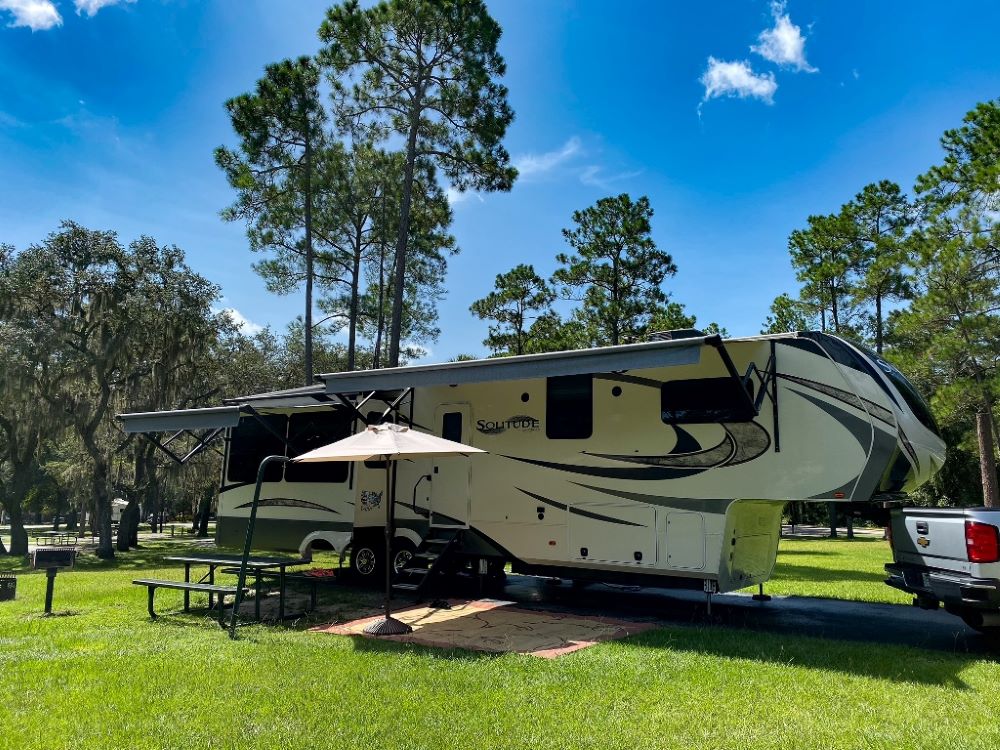
Budgeting and Expenses
Before diving into the full-time RV lifestyle, it’s essential to understand the costs involved. Most spend between $1,800 to $5,500 depending on family size per month for full time RV travel.
Some expenses you’ll need to budget for include:
- Full Time RV insurance: Just like any vehicle, your RV needs insurance. The cost of a full time RV policy will depend on factors like the size of your rig and its value. Plan to spend at least $900 per year for a good full time RV policy.
- RV park fees: Staying at an RV park can cost between $500 to $3000 per month, depending on the amenities offered and the location. Stays of a month or longer also often pay for electricity.
- Fuel: Gasoline or diesel costs will vary depending on the state, your travel frequency, and RV/vehicle fuel efficiency. Gas is more expensive on the west coast.
- Groceries: Food expenses will depend on your diet and cooking habits. Be prepared to budget more for groceries than you would for a stationary lifestyle, as food costs vary by state, and discount stores aren’t always available.
- Towing vehicle costs: If you need a separate vehicle to tow your RV, consider insurance, fuel, loan payments, and maintenance expenses.
- Maintenance and repairs: Regular maintenance is necessary for an RV’s longevity, and unexpected repairs may arise. Take these costs into account when budgeting.
- RV Loan Monthly Payments and Credit Cards
- Propane: You can save money on propane by using a space heater and cooking using electricity versus gas.
- Laundry
- Mail Service
- Health Insurance: Make sure you have a plan that covers you nationwide while you are traveling.
- Activities: Consider saving money by enjoying cheap or free outdoor activities. Grabbing an America The Beautiful National Park Pass can help save money as you travel.
- Road Tolls
- Phone and Internet: Never rely on campground Wi-fi if you need internet for school or work.
- Campground Memberships and Annual Discount Programs
SAVE 15% off a Harvest Hosts Membership!
Full-Time RV Living Money Saving Tips
To help afford your full-time RV lifestyle, consider some money-saving tips:
- Reduce RV park fees: Opt for more affordable campgrounds such as state parks or boondocking on free land when possible.
- Join discount clubs: For privately owned campgrounds, use memberships like Good Sam Club, Passport America, CampersCard, Harvest Hosts, and Boondockers Welcome to save on overnight camping costs.
- Track your expenses: Monitoring your spending can help you identify areas where you can cut costs.
- Solar panels: Installing solar panels can reduce your reliance on external power sources and can allow you to enjoy free boondocking locations.
- Plan your travel to save: Carefully planning trip routes can help you save on fuel by minimizing unnecessary travel. Staying in each place longer and reducing travel distances can help to save.
- Limit Eating Out: Bring your own picnic meals and snacks when out exploring to save money. Avoid eating out.
- Cheap Or Free Activities: Consider outdoor activities for your entire family such as hiking, biking, ranger programs, paddling, or nature centers for low-cost entertainment. Grab the America The Beautiful National Park Pass to save money on entrance fees.
- Pick Electric Over Propane: Use your RV fireplace or a space heater when temps are a little chilly versus the RV furnace. Note the furnace is needed when it dips below freezing to help keep the tanks and pipes warm. Use electricity for the RV hot water heater and for cooking to save propane.
- Save Money On Gas: Save on fuel costs at the pump by using the Good Sam Membership or TSD Logistics Fuel Card for truck stop diesel discounts.
By understanding the costs involved in living full-time in an RV and applying these money-saving tips, you can make an informed decision about whether the RV lifestyle is right for you.
SAVE 15% off a CampersCard campground
discount program!
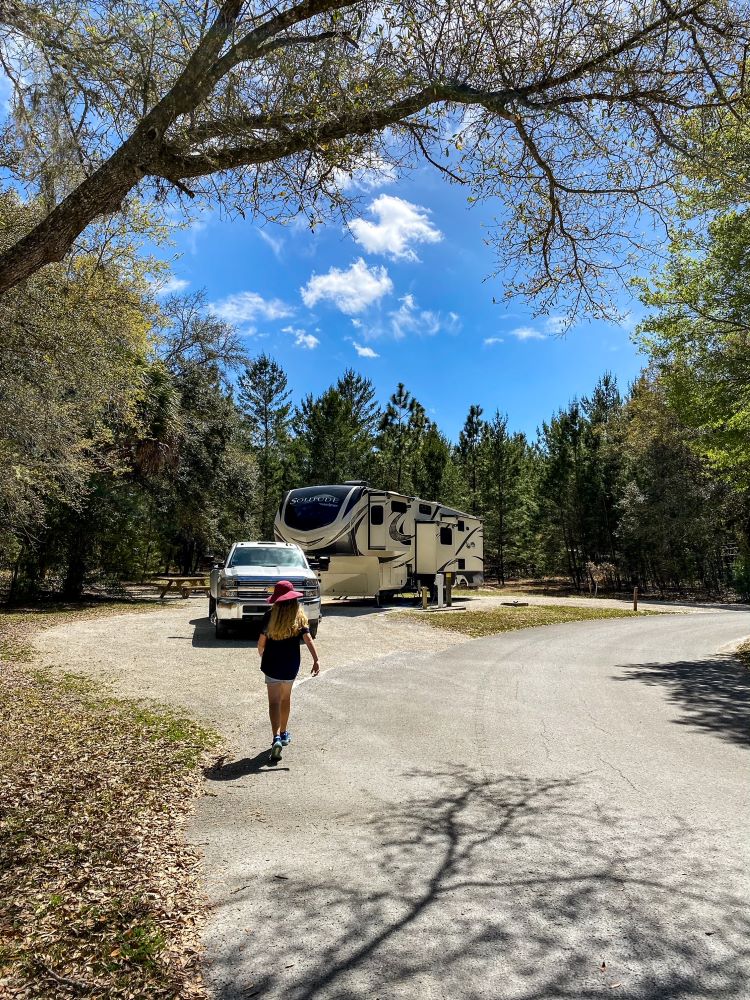
Choosing a Domicile and Managing Mail
When living in an RV full-time, one of the first things you need to consider is choosing a domicile state.
This will be your legal residence, and it affects various aspects, such as taxes, voting, vehicle registration, and insurance.
Some popular domicile states for RVers include Florida, Texas, and South Dakota due to their favorable tax laws, absence of state income tax, and easier residency requirements.
Most RVers choose a domicile state that they visit often or have some business ties. Feel free to consult a domicile lawyer, as I am not providing legal advice here.
Your domicile address will be your legal address.
It’s also the address where you will register your RV and vehicle, where your vehicles are insured, and where you can receive mail.
Having a reliable system for receiving and forwarding your mail while living on the road is essential. There are several options for managing your mail.
Using A Friend’s Or Family Member’s Address
This is a simple solution if you have a trusted person who can handle your mail. Just forward your mail to their address, and they can send it to your current location.
Mail Forwarding Service
Many companies specialize in mail forwarding services for RVers.
These services not only forward your mail but might also offer additional features such as mail scanning, package handling, and check depositing.
A popular option includes Escapees RV Club Mail Service, which also helps you to establish a domicile.
Mail Scanning Service
If you don’t require physical access to your mail, a mail scanning service can be a perfect solution. These services receive your mail, scan it, and then upload it to a secure online portal for you to view and manage.
To set up your mail forwarding system, be sure to update your address with all relevant institutions, such as banks, insurance providers, and the Department of Motor Vehicles.
Register your vehicle in your domicile state and get your driver’s license updated as well.
Finally, when it comes to voting, most states allow RVers to vote using an absentee ballot.
Just make sure you’re registered to vote in your chosen domicile state and request an absentee ballot well in advance of any elections.
Our family uses Escapees as our legal address and domicile. We have Escapees send us our mail periodically as we travel.
They also have a scanning service and can send packages. Escapees Mail Service has been very convenient for our RV lifestyle.
Working Remotely on the Road
Need to earn an income while traveling?
With more mobile internet options and online job opportunities, it’s easier than ever before to work while full time RV traveling.
Essential Tools for Remote Work
When living the full-time RV lifestyle, working remotely can be an important part of your daily routine.
To succeed, make sure you have essential tools to stay connected and productive.
First, equip yourself with a reliable laptop or tablet that can handle your work demands.
Ensure it has a long-lasting battery life and sufficient memory and processing power.
Next, invest in quality noise-canceling headphones.
These will help you stay focused on your tasks by reducing background noise from your environment.
Lastly, consider portable storage devices, like external hard drives or cloud services, to keep your files secure and accessible.
Keeping back-ups of your work is crucial when working on the go.
Finding a Stable Internet Connection
A stable internet connection is vital for remote work in an RV. Never rely on campground Wi-fi!
Here are some solutions to stay connected.
Mobile Hotspots
Use your smartphone or purchase a dedicated mobile hotspot to create a personal internet connection.
Select a data plan from your cellular provider that ensures enough coverage and bandwidth for your work needs.
Review campgrounds ahead of booking them to make sure your service will work there.
We love to use the free website Campendium to check internet and phone coverage.
Signal Boosters
Opt for a cell signal booster to improve your reception in areas with weak connectivity.
It will enhance your mobile hotspot’s performance and ensure a stable connection for your remote work.
Satellite Internet
The best new option for RVers working or attending school online is Starlink Satellite Internet.
The service is fast, unlimited, and works in the mountains or rural areas where cell phone carriers struggle.
You do need to have a clear North sky for Starlink to work.
We work online as freelance travel writers and content creators.
Reliable internet is a must for our digital nomad lifestyle while RV traveling.
We have Starlink and, as a backup, T-Mobile hotspots on our cell phones, just in case.
Why do we have 2 forms of the internet?
We often camp in heavily wooded state parks where Starlink sometimes doesn’t work.
If there is tree coverage blocking the North sky, we can’t always get a signal.
That is when we will use our backup T-Mobile hotspots.
We recommend having a backup if you are using Starlink and need the internet for work.
To maximize productivity, choose workspaces with minimal distractions, such as working from the RV or at a nearby cafe.
Balance your travel days with your work hours to avoid stress and make the most of your full-time RV living experience.
Working from the road can be a rewarding experience. The flexibility is amazing!
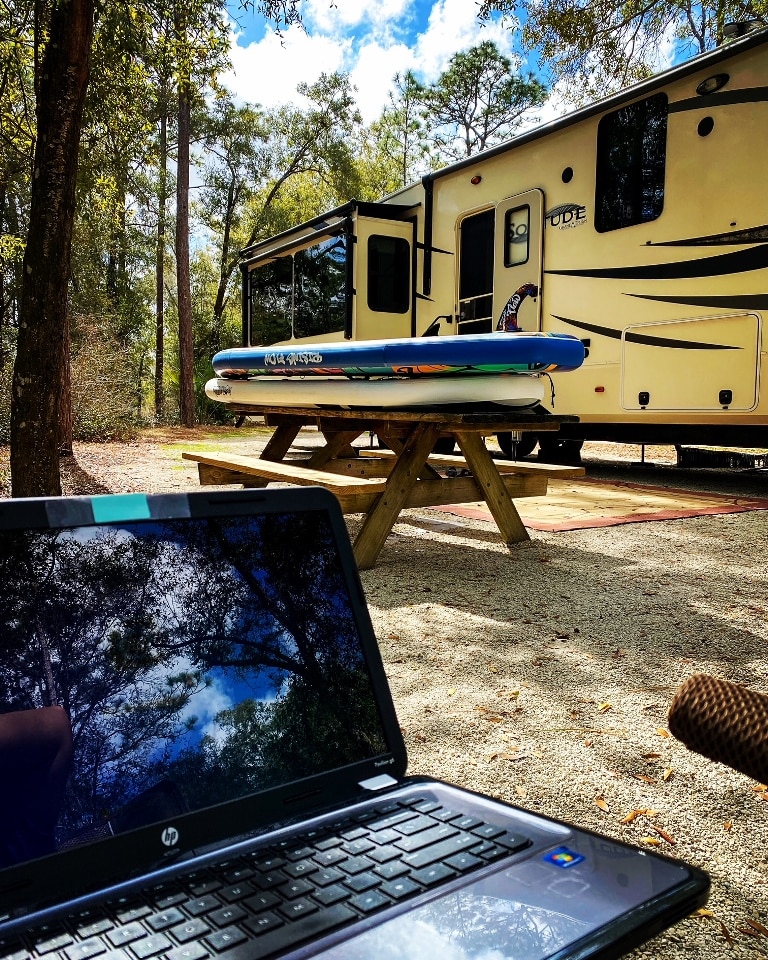
Maintaining Relationships and Building Community
Living in an RV full time might seem isolating, but there are many opportunities to meet new friends and other RVers.
Maintaining relationships and building a community is possible on the road.
It’s easy to use technology to video call loved ones and friends back home while connecting with new like-minded people travelers on the road.
To maintain your relationships with family and friends, consistent communication is key.
Keep in touch with your loved ones regularly through phone calls, video chats, and social media updates.
Share your experiences and make an effort to celebrate important occasions remotely.
This way, you can reassure those who care about you that distance does not diminish your bond.
Building a community while RV living full time in an RV can seem challenging initially.
However, there are plenty of resources and platforms designed to connect you with fellow RVers.
Engage with online forums and Facebook groups, attend RV events like rallies, and participate in campground activities to make friends who share your lifestyle.
It’s also important to remain open and welcoming to new connections.
Introduce yourself to neighbors at campgrounds, be approachable, and engage in conversations with fellow RVers.
Sharing travel experiences out on the open road, exchanging tips, and discussing common interests can quickly lead to lasting friendships on the road.
By being friendly and attending campground events, you can strengthen your sense of community.
Staying Healthy on the Road
Staying healthy while living in an RV full-time may seem challenging, but it’s entirely possible by following some simple tips.
One important consideration is your health insurance coverage.
Be sure to choose a comprehensive policy that will cover you in various states, as you’ll be traveling frequently.
Having telehealth coverage can also be very handy when you are traveling frequently.
Keep a well-stocked RV with healthcare items or natural remedies to take care of many day-to-day health concerns on your own.
This can really help when you are in rural areas of the united states with limited supplies nearby.
Another essential aspect of staying healthy on the road is maintaining a balanced diet.
Eating well can be easier than you think during your RV adventure.
Opt for one-pot meals with simple cleanup, and incorporate plenty of fruits and vegetables into your meals.
This will not only help you feel your best but will also save you money and time for other enjoyable activities.
We do almost all of our cooking in our one-pot Ninja Foodi.
It’s quick after a day of adventuring and has baking, pressure cooking, and air fryer features all in one pot for easy clean up in our small kitchen.
Living in an RV doesn’t mean you have to sacrifice physical activity.
Take advantage of the great outdoors by engaging in regular exercise such as hiking, biking, or even just going for a walk.
This keeps you active, and the fresh air will boost your mood and overall well-being.
Lastly, don’t forget the importance of a good night’s sleep.
Ensure your RV sleeping area is comfortable and dark, minimize noise, and establish a consistent sleep schedule.
You also may want to upgrade your RV mattress, as the one that comes in most RVs is complete garbage.
This way, you’ll wake up energized and ready to take on each day of your full-time RV lifestyle.
Planning Your Travels and Destinations
Finding Campgrounds And Overnight RV Parking
When planning your travels, it’s essential to find suitable campgrounds and overnight RV parking.
A great resource to look for privately owned campgrounds is Campspot.
National parks and popular campgrounds offer a range of options, from RV parks with full hookups to boondocking sites with minimal amenities.
Always research regulations and restrictions on campgrounds, and consider joining organizations like Harvest Hosts or Boondockers Welcome to widen your options for overnight parking versus just overnighting in allowed parking lots.
Boondocking, or dry camping, is a popular choice for life on the road, as it allows you to stay in more remote areas without paying campground fees.
However, be prepared with essentials like water, food, a generator or solar power, and a plan for waste disposal.
National parks often have incredible camping areas, but they usually require reservations and may have seasonal closures.
Be sure to research before arriving to avoid any surprises.
Tools To Plan An RV Friendly Route
To ensure smooth travels and avoid any unexpected challenges, use tools and resources designed specifically for RV navigation when planning your route.
These help you identify height and weight restrictions, low-clearance bridges, and non-RV-friendly roads.
Our favorite resource is RV Life Pro. This suite of products includes an RV Safe GPS, RV Trip Planner, Campground Finder, and an RV Maintenance Tracker.
Remember to consider the size and capability of your RV when selecting your route.
Avoid narrow or steep roads, and be prepared to adjust your route based on weather conditions or road closures across North America.
By planning your travels and destinations, you can enjoy a memorable and stress-free full-time RV lifestyle.
Get your RV Life Pro FREE TRIAL HERE !
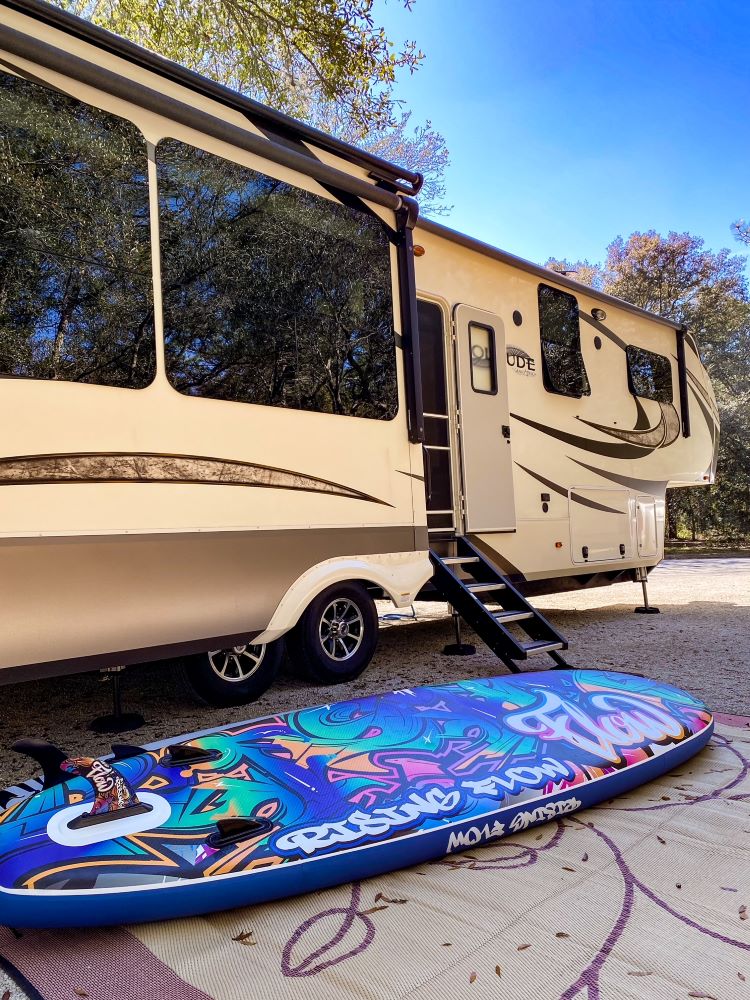
Efficient Use of Space in Your RV
Living in an RV requires a strategic approach to make the most of the limited space available.
In this section, we will explore storage solutions that can help you keep your belongings organized, maximize the functionality of your appliances, and maintain a comfortable living environment in a tiny space.
Storage Solutions
To make the most of your storage space, it’s essential to be creative and efficient. Here are some tips to help you achieve that:
- Utilize vertical space: Install shelves, hooks, or hanging organizers to take advantage of the unused areas on your walls and doors. This is especially useful in the kitchen and bathroom.
- Choose multi-functional appliances: Opt for compact appliances that can perform multiple tasks, such as a combination convection oven and microwave. Also, consider a one-pot appliance like the Ninja Foodi. This helps to save space and reduce clutter.
- Think minimalist: Before moving into your RV, downsize your belongings and only keep essentials. The more minimal your possessions, the easier it will be to maintain a neat and organized living space.
- Opt for collapsible or foldable furniture: Folding tables, collapsible chairs, or retractable beds can be stored away when not in use, opening up valuable floor space.
- Tame the shoes by the door: The biggest challenges in RV storage is often where to put the shoes. Consider a hanging shoe rack by the door or Ikea’s TRONE organizer. Even a basket or storage ottoman by the door can help tame the dreaded shoe pile!
Remember that each RV is different, so it’s essential to customize your storage solutions based on your specific needs and available space.
By staying organized, making the most of your appliances, and adopting a minimalist mindset, you’ll create a comfortable and functional living environment in your tiny home on wheels.
Important Tips for RV Maintenance
One of the keys to living comfortably in an RV is keeping up with proper maintenance.
A well-maintained RV will prevent many larger and more expensive repairs in the long run.
Here are some essential maintenance tips to ensure your RV stays in top shape.
Keep Up With Regular Maintenance
Just like any vehicle, your RV needs regular maintenance to run smoothly.
You can keep track of every single maintenance item for your RV using a program like RV Life Maintenance, which is part of RV Life Pro.
They’ll also send you email reminders based on your personalized maintenance schedule.
Check Your Water Tanks
Water tanks are a critical component of your RV, as they store both fresh and wastewater. Regularly inspect your tanks for leaks, cracks, or damage.
Properly clean and sanitize fresh water tanks, and ensure you empty and clean your waste tanks as recommended by the manufacturer.
Inspect Your Tires And Brakes
You’ll need to check your RV’s tires on a regular basis for adequate pressure, wear, and any potential damage.
A tire blowout can lead to a dangerous situation on the road. Consider upgrading your tires if your RV came with cheap no-name tires.
Similarly, make sure your brakes are in good working condition.
This may involve regular brake pad inspections and fluid checks.
Be Prepared For Roadside Emergencies
Despite your best efforts, sometimes unexpected issues can still arise while living in an RV.
Having a solid roadside assistance plan specifically for RVs, like Good Sam’s Roadside Assistance, can help you handle any unforeseen breakdowns or accidents.
Choose a plan that covers towing, flat tire assistance, and other emergency services you might need on the road.
Learn Basic RV Maintenance
To save time, money, and potential headaches, it is worth learning some basic RV maintenance skills for full-time RVers.
The best way to start is by familiarizing yourself with your RV’s owner’s manual, as it will contain important information on the proper care and maintenance of your particular model.
Simple maintenance tasks like cleaning and lubing slide rails, tightening tire lugnuts, inspecting your roof/caulking, and cleaning air conditioner units can save you money if you learn to do it yourself.
You can also explore resources like RV tech courses to gain more skills. YouTube is every RVers best friend!
Get your RV Life Pro W/ RV Life Maintenance FREE TRIAL HERE !

FAQs Can You Live In An RV? Full-Time RV Living Questions Answered
Is full time RV living worth it?
Full time RV living isn’t always easy or cheap, however it is worth it for the incredible travel experiences. Consider your why for RV living and research the pros and cons to see if the RV lifestyle is right for you.
What RV is best for full time living?
The best RV for full time living meets the right amount of living space while also still fitting in the campgrounds you wish to stay at. Choose an RV that won’t strap you financially but will also be comfortable to serve as your house on wheels.
Is full time RV living cheaper?
Full time RV living can be cheaper than a house payment or rent. RV living costs depend on RV payments, campground fees, gas, activities, and RV repairs. Boondocking and paying cash for an RV can offer savings over traditional living.
Is full time RV living illegal?
Full time RV living can be illegal if you are parked in an area where overnight RV stays aren’t allowed. Local zoning laws prevent RV living on some private property. You also can’t just live in an RV on the street, as this is illegal.
Does living in an RV full time void warranty?
Depending on the type of RV you own, living in an RV full time can void the warranty. Some RVs are rated for RV living, such as many Grand Design models, so there is no issue. However, most RVs are not designed to live in. Always check the warranty details before choosing an RV to live in.
What do I need for full time RV living?
The essentials for RV living include a reliable RV, essential kitchen appliances, necessities for personal hygiene, a comfortable bed, tools for RV maintenance, and a way to stay connected to the internet. Investing in multi-functional items can help maximize storage and enhance efficiency.
How much does full time RV living cost?
The cost of full-time RV living varies widely depending on your lifestyle, the type of RV, and the locations you choose to visit. On average, you can expect monthly expenses to range from $1,500 to $5,500, which includes campsite fees, gasoline, groceries, insurance, maintenance, and other essentials.
What RV is rated for full time living?
Many RV models are rated for full time living. Most coaches are, and so are some fifth wheels and travel trailers. Brands that have RVs rated for RV living include Redwood, DRV Suites, Grand Design, Alliance, Brinkley, and Fleetwood.
Are there legal considerations for living in an RV?
Yes, there are legal considerations to be aware of when living in an RV full-time. Laws and regulations regarding parking, length of stay, and other restrictions can vary depending on the state laws or county you’re in. You may also need to establish legal domicile for tax purposes and vehicle registration.
What are some tips for preparing for stationary RV living?
To prepare for stationary RV living, you should find a location with access to water, electricity, sewer, and internet. Ensure the location allows for long-term stays or if there are any restrictions on how long you can park your RV.
How can you stay safe while living in an RV full-time?
You can stay safe while living in an RV full-time by checking in with a friend or family member when you arrive and sharing your plans with them. To stay safe on the road, always keep your speeds down when towing or driving an RV, avoid overloading the RV, and upgrade the RV tires.
What are the advantages and disadvantages of full-time RV living?
Full-time RV living offers numerous advantages, such as the freedom to travel and explore, a more minimalistic lifestyle, and the opportunity to form lasting friendships. However, it also comes with disadvantages that include limited living space, finding RV parking, continuous maintenance tasks, and adjusting to life on the road.
Can you live in an RV park year round?
You can live in many RV parks year round. It depends on the local rules and the campground rules. Some RV parks don’t allow extended stays or limit the number of annual lot renters. Always call to check.
Can you live permanently in an RV?
There are many places where you can live permanently in an RV. Always check the local regulations and zoning rules to see if you can live in an RV on your property or someone else’s. There are many campgrounds that allow you to live in an RV.
Can you live in an RV year round in Florida?
Yes, in many places, you can live in Florida year round! Some counties allow RV living on privately owned land, but you need to verify zoning laws. Many Florida campgrounds also allow RV living.
Can you rent an RV to live in?
You can rent an RV to live in if the RV owner is okay with a long-term rental. You also need to find a campground or privately owned land with zoning laws that allow RV living to have a place to park the RV.
Can you live in an RV in a trailer park?
You can live in an RV in many trailer parks. Trailer parks are already equipped with the right hookups for RVs. We have stayed at some part mobile home park and part RV park businesses during our travels. You need to call and confirm that RVs are allowed for long-term lot rentals.
Can you buy a lot and live in an RV?
In some areas, you can buy a lot and live in an RV. It all depends on local zoning rules and regulations. It is important to do all the research necessary with the county to be sure this is allowed before purchasing the land.
Can you temporarily live in an RV?
Depending on the zoning laws and regulations in your area, you may be able to temporarily live in an RV on private property. Most RV parks and campgrounds also allow you to live in an RV. Make sure to research where this is allowed.
How long can you live in an RV while building a house?
Many areas do allow you to temporarily live in an RV while building a house. However, most have strict rules regarding how long you can stay in the RV and regarding the forward progress of the building project. Make sure to find out the details in your county.
What states can you live in an RV full time?
The RV friendliest states where you can live in an RV full time include Texas, Florida, South Dakota, Nevada, Arizona, Oregon, Wyoming, North Carolina, Montana, and Idaho. Even in these states, always research local zoning laws and regulations on where and how long you can park your RV.
Can you live in an RV in Los Angeles?
You can live in an RV in Los Angeles, but it is subject to local laws and regulations. It is illegal to park an RV on a public street for more than 72 hours in a row. However, there are RV parks and private properties where you can legally park and live in an RV in the Los Angeles area.
Can you live in an RV in Portland?
Yes, you can live in an RV in Portland, but there are some regulations and restrictions to consider. You can park an RV on private property for up to 30 days in a year without a permit, but if you plan to live in the RV full-time, you will need a permit. Always research the regulations in the area you plan to park and live in an RV.
Can you live in an RV in Alaska?
Yes, you can live in an RV in Alaska, but there are certain requirements and restrictions to follow. You can park an RV on public land for up to 15 days in a row, but you must move at least 25 miles away before parking in the same area again. Additionally, there are private RV parks where you can legally park and live in an RV.
Can you live in an RV in Washington state?
Yes, you can live in an RV in Washington state, but there are certain regulations and rules to follow. You can park an RV on private property for up to 30 days in a row without a permit, but if you plan to live in the RV full-time, you will need to obtain a permit. Additionally, there are private campgrounds where you can legally park and live in an RV.
Can you live in an RV in San Diego?
You can live in an RV in San Diego, but it is subject to certain local laws and regulations. It is illegal to park an RV on a public street for more than 72 hours in a row. However, there are private properties where you can legally park and live in an RV in the San Diego area.
Can you live in an RV in Las Vegas?
It is legal, and you can live in an RV in Las Vegas, but there are rules and regulations to research. RVs and motorhomes cannot be used as legal residences if parked on the street or in your front yard. RVs parked on the street will receive a violation for more than 72 hours. However, there are RV parks where you can legally park and live in an RV.
Can you live in an RV in South Carolina?
Yes, you can live in an RV in South Carolina, but there are restrictions for each area. RVs can be used as a primary residence on a property that has a septic system or connection to a public sewer system. However, there may be local zoning laws that regulate where you can park and live in an RV in South Carolina.
Can you live in an RV in Arizona?
Yes, you can live in an RV in Arizona, but there are different regulations and restrictions to follow per area. You can park an RV on private property for up to 14 days in a row without a permit, but if you plan to live in the RV full-time, you will need to obtain a permit. There are campgrounds where you can legally park and live in an RV.
Can you live in an RV in Illinois?
Yes, you can live in an RV in Illinois, but there are specific location regulations and restrictions to follow. RVs can be used as a primary residence on a property that has a septic system or connection to a public sewer system. However, there may be local zoning laws that regulate where you can park and live in an RV in Illinois.
Can you live in an RV park year round in California?
Yes, you can live in an RV park year round in California, but it depends on the specific RV park and its policies. Some RV parks in California allow residents to live there year-round, while others have restrictions on how long you can stay. Additionally, there may be local zoning laws regarding where you can park and live in an RV.
Can you live in an RV legally in Georgia?
Yes, you can live in an RV legally in Georgia, but there are restrictions to follow. RVs can be used as a primary residence on a property that has a septic system. However, there may be local ordinances that regulate where you can park and live in an RV in Georgia.
Can you live in an RV in New York?
Yes, you can live in an RV in New York, but there are specific regulations. You can park an RV on private property for up to 48 hours in a row without a permit, but if you plan to live in the RV full-time, you will need to obtain a permit. Additionally, there are private RV parks where you can legally park and live in an RV.
Can you live in an RV park in San Diego?
Yes, you can live in an RV park in San Diego, but it depends on the specific RV park and its policies. Many RV parks in San Diego offer long-term rentals and allow residents to live there year-round, while others have restrictions on how long you can stay. There may be zoning laws that regulate where you can park and live.
Can you live in an RV in Seattle?
Yes, you can live in an RV in Seattle, but there are rules to follow. You can park an RV on private property for up to 30 days in a row without a permit, but if you plan to live in the RV full-time, you will need to obtain a permit. There are campgrounds where you can legally park and live in an RV.
Can you live in an RV in Santa Barbara?
Yes, you can live in an RV in Santa Barbara, but it depends on the specific location. You can park an RV on private property for up to 72 hours in a row without a permit, but if you plan to live in the RV full-time, you will need to obtain a permit. Private RV parks and campgrounds throughout Santa Barbara allow you to legally park and live in an RV.
Can you live in an RV in Miami?
Yes, you can live in an RV in Miami, but it varies based on the specific location and its policies. You can park an RV on private property for up to 14 days in a row without a permit, but you need a permit if you plan to live in the RV full-time. There are private RV parks where you can legally park and live in an RV.
Can you live in an RV full time in Colorado?
Yes, you can live in an RV full time in Colorado, but it may depend on the specific location. RVs can be used as a primary residence on a property that has a septic system or connection to a public sewer system. Local zoning laws regulate where you can park and live in an RV. RV parks also allow you to legally park and live in an RV.
Can you live in an RV in Oahu?
Yes, you can live in an RV in Oahu, but each location varies. You can park an RV on private property for up to 24 hours in a row without a permit, but if you plan to live in the RV full-time, you will need to obtain a permit. Additionally, there are private RV parks where you can legally park and live in an RV.
Can you live in an RV in North Carolina?
Yes, you can live in an RV in North Carolina, but it depends on each location and its policies. RVs can be used as a primary residence on a property that has a septic system or connection to a public sewer system. Local ordinances regulate where you can park and live in an RV. Additionally, there are private campgrounds where you can legally park and live in an RV.
Can You Live In An RV? Is Full-Time RV Living Right For You?
Sure, you can live in an RV, but is the RV lifestyle a good fit? Living in an RV full-time requires careful planning, research, and consideration of various factors such as cost, location, and regulations.
While there are many benefits to living in an RV, such as flexibility, adventure, and simplicity, there are also challenges and limitations to be aware of.
Ultimately, whether or not full-time RV living is right for you depends on your personal preferences, lifestyle, and goals.
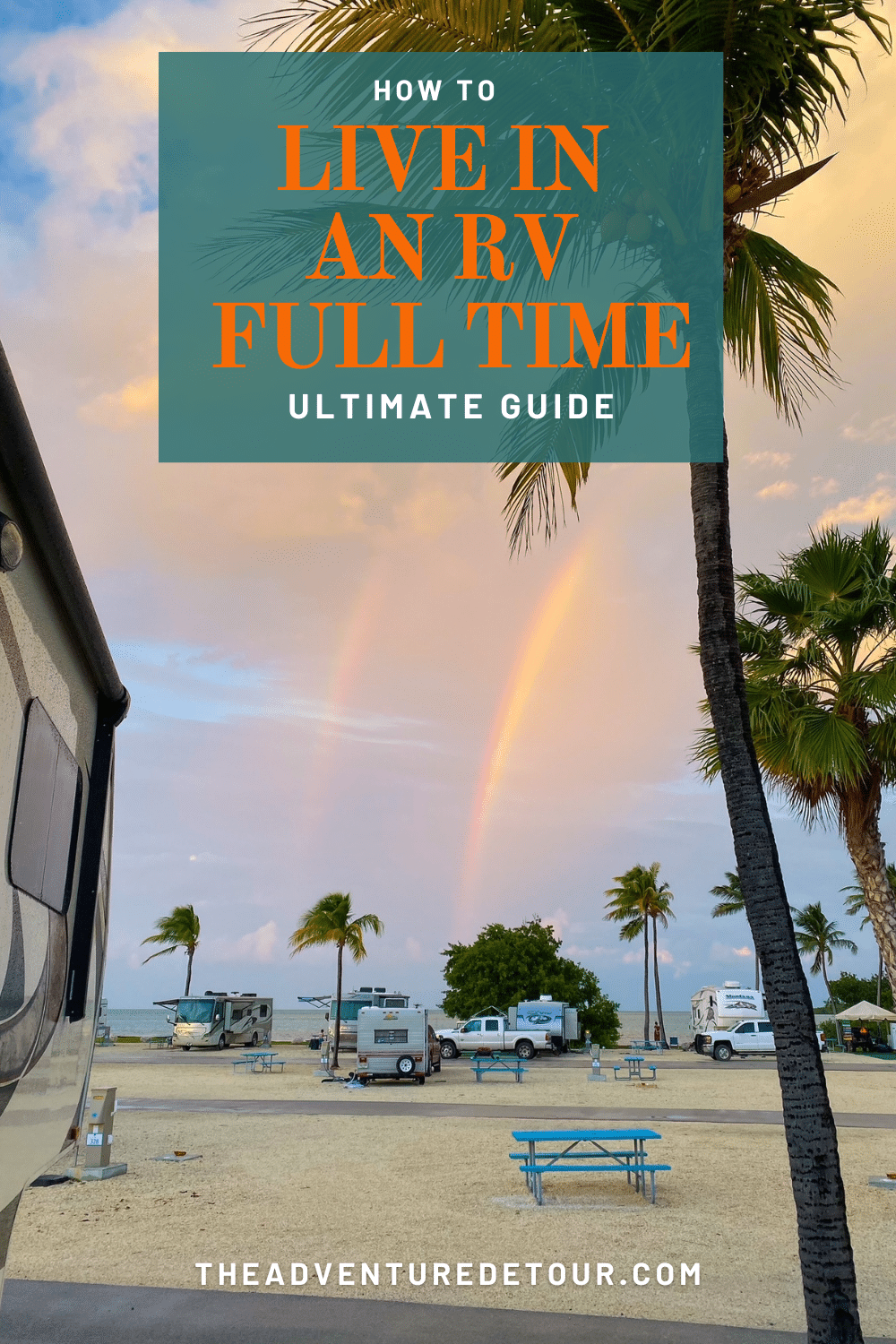
Scott and Van of The Adventure Detour are travel writers focusing on RV travel, family outdoor travel, national parks travel, and hiking. They have been full-time RV living and traveling across the US since 2015. In 8 years of full-time RVing, they have visited 38 national parks so far with the ultimate goal to see them all. They work as digital nomads while roadschooling their daughter nicknamed Sissy. On the way to all 50 states, they have visited and hiked through 42 states so far. The travel bucket list is forever growing!

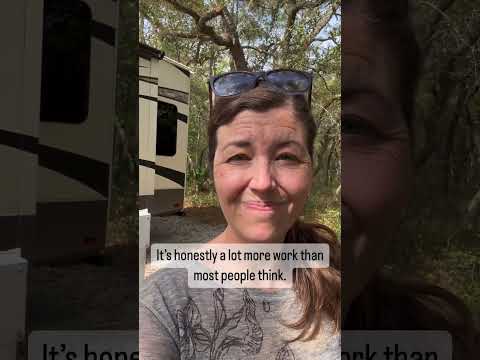

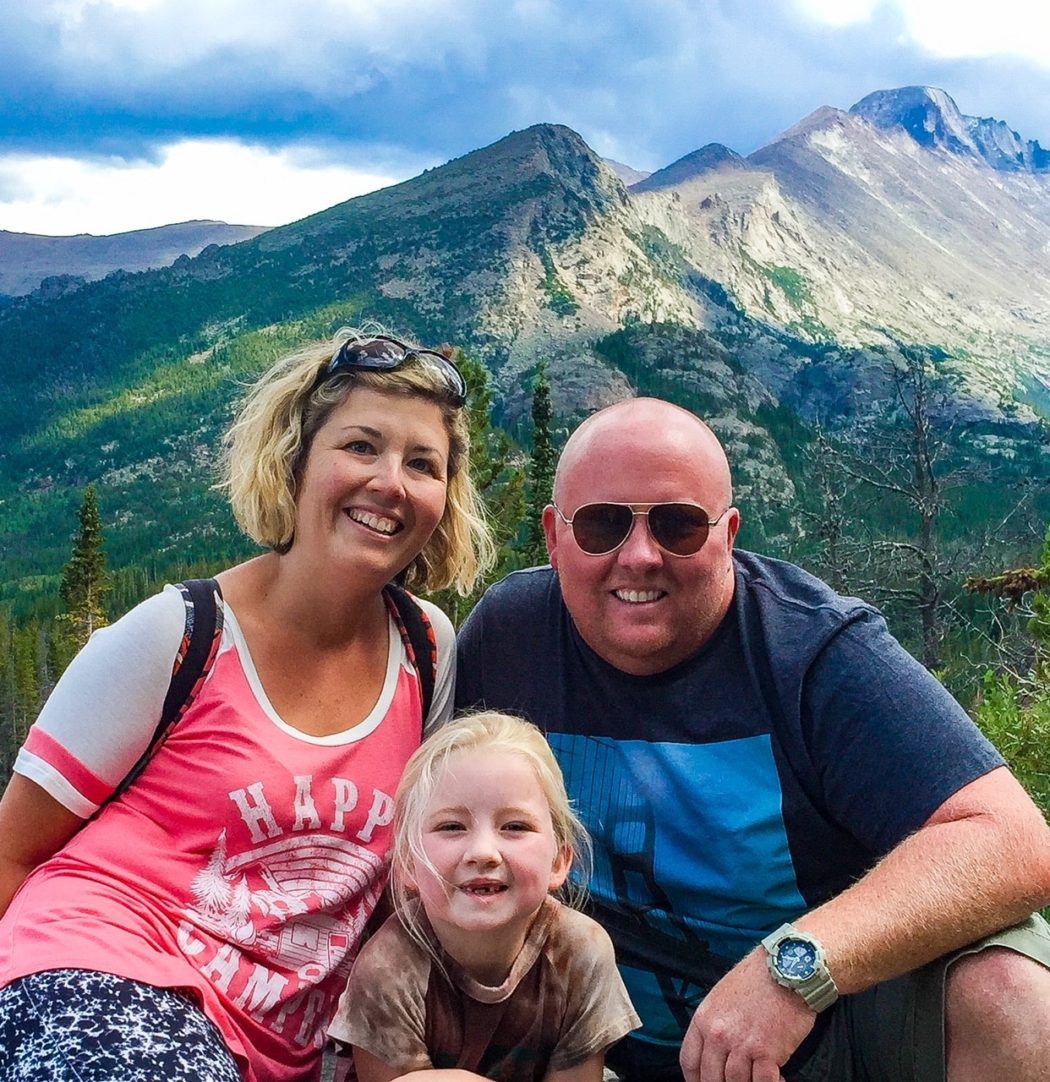
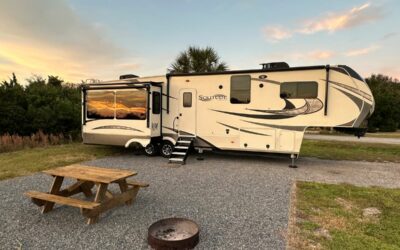
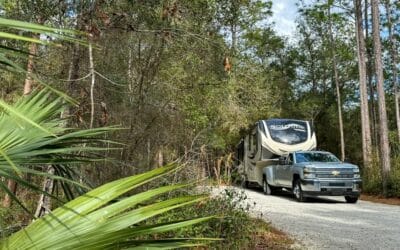
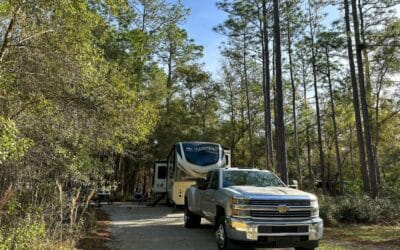

0 Comments